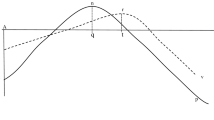Abstract
A social welfare function satisfying Arrow's independence axiom is constant or authoritarian if it generates continuous and transitive social preferences over the space of allocations of public and private goods, and individual preferences have the classical economic properties. The social welfare function will be oligarchial if it generates continuous and quasitransitive social preferences and satisfies a weak version of the Pareto criterion in addition to the independence axiom.
Similar content being viewed by others
References
Arrow KJ (1963) Social choice and individual values, (2nd ed.). New York, Wiley
Border KC (1983) Social welfare functions for economic environments with and without the Pareto principle. J Econ Theory 29: 205–216
Border KC (19) An impossibility theorem for spatial models. Publ Choice 43: 293–305
Bordes G, Le Breton M (1989) Arrovian theorems with private alternatives domains and selfish individuals. J Econ Theory 47: 257–282
Bordes G, Le Breton M (1990) Arrovian theorems for economic domains: The case when there are simultaneously private and public goods. Soc Choice Welfare 7: 1–17
Campbell DE (1990) Can equity be purchased at the expense of efficiency? An axiomatic enquiry. J Econ Theory 51: 32–47
Campbell DE (1992a) Equity, efficiency, and social choice. Oxford, Oxford University Press
Cambell DE (1992b) Transitive social choice in economic environments. Int Econ Rev 33
Kalai E, Muller E, Satterthwaite M (1979) Social welfare functions when preferences are convex, strictly monotonic, and continuous. Publ Choice 34: 87–97
Kelly JS (1991) The free triple assumption. Department of Economics, Syracuse University
Wilson RB (1972) Social choice theory without the Pareto principle. J Econ Theory 5: 478–486
Author information
Authors and Affiliations
Additional information
This work was supported by the National Sciences Foundation grant no. SES 9007953. I am grateful to anonymous referees whose suggestions led to several substantial improvements.
Rights and permissions
About this article
Cite this article
Campbell, D.E. Public goods and Arrovian social choice. Soc Choice Welfare 9, 173–183 (1992). https://doi.org/10.1007/BF00192876
Received:
Accepted:
Issue Date:
DOI: https://doi.org/10.1007/BF00192876




